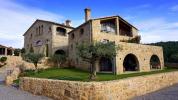H2020 AgroFossilFree Project: Strategies and technologies for achieving fossil-free European agriculture
- Type Project
- Status Filled
- Execution 2020 -2023
- Assigned Budget 1.999.937,5 €
- Scope Europeo
- Main source of financing Horizon 2020
- Project website AgroFossilFree
To feed a growing global population, the global food system needs to reduce its dependence on fossil fuels. Transitioning to an energy-smart model will protect the agri-food system, currently burdened by high and fluctuating fossil fuel prices and the risk of future fossil fuel unavailability.
The EU-funded AgroFossilFree project will bring together key stakeholders to assess and promote currently available fossil energy-free technologies and strategies (FEFTS) in EU agriculture. The aim is to bridge the gap between available FEFTS, whether commercial or derived from applicable research results, and everyday EU farming practices. The results will contribute to the development of policy recommendations and the promotion of viable strategies and technologies.
The project's objective is to create a framework for critical stakeholders to cooperate and assess and promote currently available fossil-energy-free strategies and technologies (FEFTS) in EU agriculture to reduce, in the short term, and eliminate, in the long term, the use of fossil fuels in any agricultural process from cradle to farm gate, while maintaining the yield and quality of the final product. This project will involve research, industry, extension, and the farming community so that existing research and commercial solutions can be widely communicated, while capturing grassroots needs and innovative ideas from farming communities and related industry.
Funding opportunities for the defossilization of EU agriculture will be investigated and highlighted. The specific objectives are: to consider and assess the current state of EU agriculture in relation to energy use and evaluate existing needs and interests for the future agricultural energy profile; to collaborate with all stakeholders in thematic groups using interactive physical and online methodologies to produce community-based ideas for the integration of FEFTS into agricultural systems at regional and EU levels; to create policy recommendations and communicate them to increase visibility and promote the proposed strategies and technologies in real-life agricultural activities in the near future.
Sowing the seeds for fossil-free farming practices An EU-funded project has extensively researched fossil-free technologies and strategies and developed a platform to provide information and promote their adoption in agriculture. Agriculture relies heavily on fossil resources to meet its energy needs and support its productivity. In Europe, the sector contributes 13% of total greenhouse gas emissions . New fossil-free technologies and strategies (FEFTS) may be the answer to making farming processes more sustainable, but they are not yet widely adopted in European rural areas. In light of this, a consortium of 16 partners has been working on the EU-funded AgroFossilFree project .
Its ambition was to create a framework to promote FEFTS, encouraging information exchange between research, industry, and farming communities. Aiming to reduce fossil fuel use in agriculture, the project contributes to major EU strategies, such as the European Green Deal and the Farm to Fork strategy. “Farmers are generally willing to participate in the sustainable transition, and integrating FEFTS is now possible due to its robustness and relative affordability, if we manage to overcome critical barriers through effective policy implementation with a long-term perspective,” says Thanos Balafoutis, AgroFossilFree project coordinator. A unique platform for FEFTS In the current EU context, the main challenges to FEFTS adoption include high initial investment, a lack of training and demonstration of these solutions in real-world conditions, as well as the need for relevant policy changes, coupled with lengthy bureaucracy.
To overcome these barriers, AgroFossilFree developed the AgEnergy platform as a single access point for promoting information on FEFTS. Available in eight different European languages (Danish, Dutch, English, German, Greek, Italian, Polish, and Spanish), it showcases FEFTS solutions through scientific articles, research projects, commercial technology, training materials, and available funding programs that facilitate the adoption of the solutions. Furthermore, the platform features an artificial intelligence function that functions as a decision-support toolkit. "Using a questionnaire, the tool mimics the consultation process in which experts assess end-user needs and propose the most interesting interventions.
It provides direct links to the solutions that best fit farms, improving the visitor experience and giving visibility to solution providers,” explains Balafoutis. To date, the platform has published materials on 1,959 FEFTS and has gained 469 registered users and 3,000 unregistered unique users. Creating Change Through Policy AgroFossilFree analyzed the energy consumption and needs of agriculture in the region. For example, in open-field agriculture, fertilizer production and use account for around 50% of all indirect energy inputs. Livestock manure has great potential as an organic fertilizer and for renewable energy production.
Regarding greenhouses, heating accounts for up to 99% of all energy inputs, and most methods used in the EU rely on fossil fuels. With this knowledge, the project identified and evaluated currently available FEFTS that can provide greater sustainability. After extensive research, the consortium produced 19 policy briefs covering horizontal and general policies, as well as specific policies, further supporting methods to defossilize agriculture.
- ETHNIKO KENTRO EREVNAS KAI TECHNOLOGIKIS ANAPTYXIS (CENTRE FOR RESEARCH AND TECHNOLOGY HELLAS CERTH)







